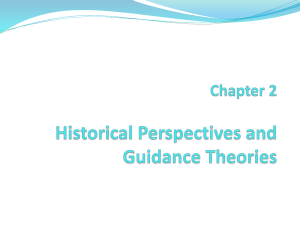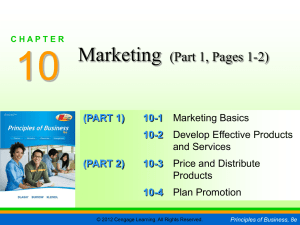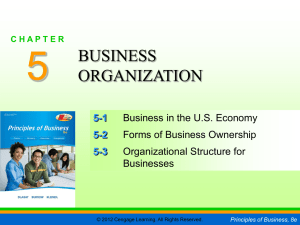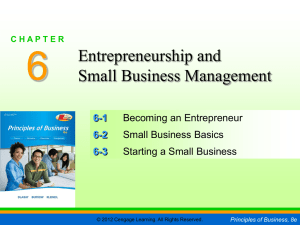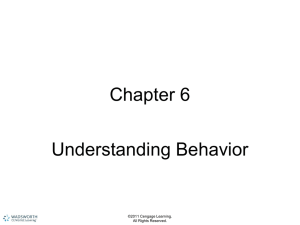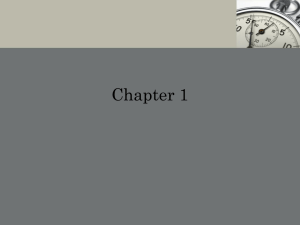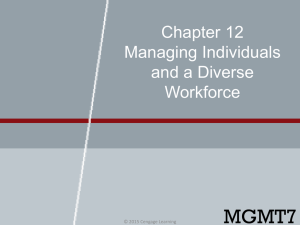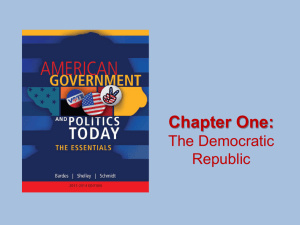Public Opinion and Policy Making2
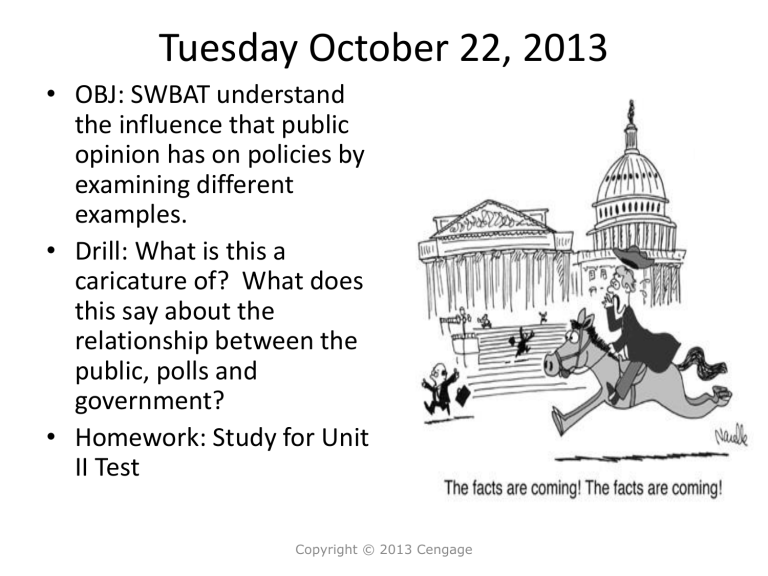
Tuesday October 22, 2013
• OBJ: SWBAT understand the influence that public opinion has on policies by examining different examples.
• Drill: What is this a caricature of? What does this say about the relationship between the public, polls and government?
• Homework: Study for Unit
II Test
Copyright © 2013 Cengage
Copyright © 2013 Cengage
• WHO GOVERNS?
1. How does public opinion in America today vary by race, gender, and other differences?
2. What is political ideology, and how does it affect political behavior and influence public policy?
• TO WHAT ENDS?
1. What role did the Framers of the Constitution think public opinion should play in American democracy?
2. When, if ever, should public policies mirror majority opinion?
Copyright © 2013 Cengage
Copyright © 2013 Cengage
Why Does Government Policy Often Appear At
Odds With Public Opinion?
• The Framers of the Constitution did not try to create a government that would do from day to day “ what the people want.
”
• They created a government for the purpose of achieving certain substantive goals.
Copyright © 2013 Cengage
Public Opinion and Democracy
The Framers of the Constitution created a government to achieve certain goals:
“ to form a more perfect Union, establish Justice, ensure domestic Tranquility, provide for the common defense, promote the general Welfare, and secure the Blessing of Liberty.
”
– Preamble to the Constitution
Copyright © 2013 Cengage
Characteristics of Policy-Making
• Economic Policy:
• a government policy for maintaining economic growth and tax revenues
• Fiscal Policy:
• a government policy for dealing with the budget (especially with taxation and borrowing)
• Monetary Policy:
• Monetary policy is the process by which the monetary authority of a country controls the supply of money, often targeting a rate of interest for the purpose of promoting economic growth and stability. The official goals usually include relatively stable prices and low unemployment
Copyright © 2013 Cengage
Why is Public Opinion Important?
Democratic governments rest on the consent of the governed.
-- Hence, major shifts in public opinion should trigger a shift in public policy
-- But public opinion is often unstable, weak, ill informed or nonexistent
-- So public officials have flexibility in dealing with public issues
This attention to public opinion has created an industry in public opinion polling and survey research.
Survey Research: Can We Believe the Polls?
Many organizations regularly sponsor independent national surveys.
-- CBS, ABC, NBC, FOX, Gallup , Washington
Post , Time , Newsweek
Political candidates also contract with private marketing and opinion research firms to conduct surveys in conjunction with their campaigns.
The Impact of Issues
Survey Research: Can We Believe the Polls?
A “good” poll depends upon the selection of a random sample of persons chosen in such a way which insures that every person in the universe of people has an equal chance of being selected for interviewing.
National samples usually begin with 1,000 or more randomly selected persons
-- the larger the sample, the more accurate the results
-- the larger the sample, the more costly it becomes
Survey Research: Can We Believe the Polls?
The accuracy of the results primarily depends on the randomness and size of the sample as well as the wording of the questions.
Leading questions are often used by unprofessional pollsters to produce a result favorable to their side.
Survey researchers can estimate the sampling error through the mathematics of probability.
-- the sampling error is usually expressed as a percentage range —for example, plus or minus
3 percent
Survey Research: Framing the Question
Do you believe that waterboarding is torture and that the U.S. has a moral responsibility to not engage in or condone any form of torture?
-- the question is confusing as there are two issues that are presented: is waterboarding torture and whether the U.S. should engage in it
Do you believe that abortion should be legal?
-- the question is oversimplified as many people believe that abortion should be legal under certain circumstances
Should the Obama administration step back from the rush to create “cap and trade” energy legislation that will cost jobs, harm future economic growth, and impose an estimated $1,761 new energy tax on American families?
-- the question is biased
Characteristics of Policy-making
• Foreign Policy:
• a government's strategy in dealing with other nations.
• Social Welfare Policy:
• The study of social services and the welfare state. It focuses on the idea of social welfare and its relationship to politics and society. Specifically, it also considers detailed issues in the society and encourages the study and teaching of social welfare policy, policy practice within social work education and its importance.
Copyright © 2013 Cengage
How Does Public Opinion Affect
Policy?
• Get into groups of five.
– Count off in fives.
– Meet up with your number groups.
– Read your article together
– Summarize it, and explain how, if at all public opinion determines public policy.
– Get back in your original groups and share your findings.
Copyright © 2013 Cengage
Copyright © 2013 Cengage
Public Opinion
•
Public opinion is important in US
– Opinions about a given government policy can change over time, often dramatically
– Public opinion places boundaries on allowable types of public policies
– Citizens often provide opinions on which they have no expertise
– Governments tend to respond to public opinion
– The government sometimes does not do what people want
Public Opinion and
Models of Democracy
• Opinion polling dates from the 1930s
• Not a powerful research tool until computers invented in 1950s
• Founders built public opinion into structure of government by allowing direct election of representatives to the House and apportioning representation there by population
Sampling a Few,
Predicting to Everyone
• Statistical theory of sampling holds that a sample of a population selected by chance is representative of that population
• Three factors affect accuracy of sample:
– Must be chosen randomly
– Larger samples more accurate
– Greater variation in population means greater chance for differences in ability to predict
Accurate Polling
•
Most national opinion polling organizations poll 1,500 individuals
– Accurate within 3 percentage points 95% of the time
– Even this small margin of error can mean incorrect predictions in close elections
•
Polls can be wrong because of biased question wording or superficial responses
•
Look at current polls: http://www.pollingreport.com
Public Opinion and Democracy
•
Majoritarian model of democracy holds government should do what a majority of the people want
– Around 70% of Americans think majority opinion should have a great deal of influence on politicians
•
Pluralist model of democracy believes democracy requires free expression of opinions by minority groups
– Public as a whole rarely demonstrates clear, consistent opinions
Do We Really Know What The Public
Thinks?
• It is not easy to know what the public thinks.
• A few simple, clear-cut and widely discussed issues may allow for some degree of certainty.
• But, with many lesser-known issues that certainty may be missing.
Copyright © 2013 Cengage
Cleavages in Public Opinion
• Social Class
• Race and Ethnicity
• Region
Joe Raedle/Getty Images News/Getty Images
Marco Rubio, the Hispanic son of exiles from Cuba, is a conservative
Republican elected from Florida to the United States Senate in 2010.
Copyright © 2013 Cengage
Political Elites, Public Opinion, and Public
Policy
• Political elites – persons with a disproportionate share of political power.
• Elites raise and frame political issues.
• Elites state the norms by which issues should be settled.
Copyright © 2013 Cengage
Wrap Up
• In what ways can public opinion shape public opinion?
• Do you think they really have a voice?
• Which form of policy does the public have the most influence on, why do you think so?
Copyright © 2013 Cengage
WHAT WOULD YOU DO?
M E M O R A N D U M
To: Bill Byron, U.S. Senator
From: Dan Joyce, legislative assistant
Subject: Vote on path to citizenship bill
Your state has only a small illegal immigration problem, but voters have concerns both about maintaining law and order, and providing economic opportunities and a
“ path to citizenship ” for people who have resided in this country for many years.
As you contemplate both your vote on the bill and your possible presidential bid as a Republican, note that public opinion on the subject is divided by party, race, ethnicity and religion. For example, an August 2010 Pew poll asked about priorities in dealing with illegal immigration: 47% of Republicans, 34% of
Independents, and 21% of Democrats cited “ better border security; ” 41% of
Hispanics, versus 19% of White evangelicals cited “ creating a path to citizenship ”
Copyright © 2013 Cengage
WHAT WOULD YOU DO?
Arguments for:
1. Your state contains a small but slowly growing proportion of firstgeneration Americans, who favor a “ path to citizenship ” for immigrants who have lived in this country for years, regardless of their legal status.
2. Illegal immigrants often take menial jobs that nobody else wants, and contribute to the U.S. economy by paying taxes and buying goods and services.
3. A “ path to citizenship, ” with fines and other penalties for being in the country illegally, is the most realistic option for individuals who have family and other long-term ties in the United States.
Copyright © 2013 Cengage
WHAT WOULD YOU DO?
Arguments against:
1. Your party leaders oppose comprehensive immigration reform, saying that enhanced border security must be a higher priority.
2. Illegal immigrants take jobs away from native-born Americans and cost more in public services, such as education and emergency health care, than they contribute to the economy.
3. People who entered the country illegally must not be rewarded for breaking the law, and enforcement can be effective with sufficient resources.
Copyright © 2013 Cengage
WHAT WOULD YOU DO?
Your decision:
Vote for bill?
Vote against bill?
Copyright © 2013 Cengage
